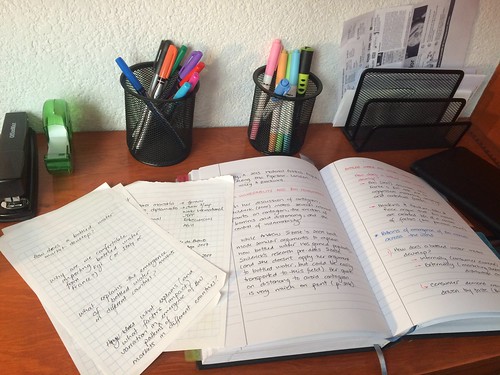Lately, I’ve seen a lot of online commentary against the “write every day” mantra. Helen Sword, in a 2016 article, released results from surveys, interviews and focus groups she conducted with academic writers, challenging the results of Robert Boice’s research. For ME, writing every day (even if just a tiny bit, as I’ve explained in my #2ThingsADay blog post) really does help me. It is also true that there are some days when I can’t write for the life of me. When I travel across the ocean and I try to adjust to the new time zone, it’s really hard for me to write every day. I have also written ad nauseam on why I think we should consider emails to coauthors, draft notes, writings on the margins of journal articles, book chapters and books, calculations, etc. all forms of academic writing.
To be perfectly honest, I get tired from having the same conversation all the time. For a lot of people, writing every day works. For others it doesn’t. Therefore, people should just do whatever they think is best for them. Regardless of the Sword-Boice debate, I think we ought to consider that making a concerted, systematic effort to write every day, or at least, some semblance of whatever writing every day looks for each person may be actually helpful for discipline purposes, or for strategic purposes. Blocking time for research (whether it’s used for writing or for reading or for researching/calculating/analysing data) is perhaps the biggest challenge we ought to consider. Given the many demands on our time, I think this is what we should be discussing (how to make the time and challenge current institutional structures that place so many responsibilities on us so that we can more effectively do our job, including research and proper time allocation for teaching preparation), rather than whether we should be writing or not every single day.
I tell my own students (undergraduate, and graduate) to write every day because I have seen through time that’s what helps them develop a systematic routine. That’s also why I recommend that they come to the office every day, for a few hours, to my lab. This is not for me to force them to just BE there, but to allow them to slowly but surely develop a framework from where to work.
I come back to Joli Jensen’s mantra: what we need is constant, low-stakes contact with a writing project. This means, write every day even if just a few words, so that you can feel you’re still in touch with your project, or write as much as you can/want/are able to endure. Constant, regular, daily contact with a project is a good thing. And yes, there are weeks when I am unable to make any contact with a research or writing project. So no, nobody is perfect, we are all trying to improve on a regular basis.
Again, the constant contact mantra is also one that Joan Bolker champions in her “write a PhD thesis in 15 minutes a day” book. It’s not that doing this in 15 minutes a day will get the dissertation written, but that you need to be in contact with your doctoral thesis or research at least 15 minutes every day. It’s again the “constant contact” mantra.
The “block time for research and writing” mantra posited by Zerubavel in the Clockwork Muse combined with the constant contact paradigm is perhaps the best combination of strategies that can help us develop a writing practice. Work around when you can’t write (mark those times) and then make time to research/write/study/learn/read – but also protect those times.
Hopefully this will be the last time I write about whether one should write every day or not. You do you.





0 Responses
Stay in touch with the conversation, subscribe to the RSS feed for comments on this post.